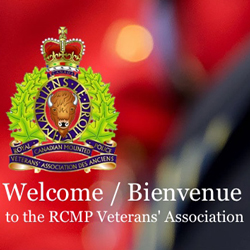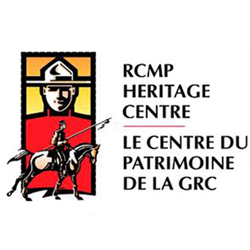Ric Hall’s Photo Corner
For this week’s Photo Corner, Ric has selected the photo theme of “RCMP Provost Corps.”
At the outbreak of World War II the Canadian Army was without any form of military police. On September 13, 1939, the RCMP requested and received permission to form a Provost Company using volunteers from its ranks.
This was designated 1 Provost Company (RCMP), of the 1ST Canadian Infantry Division, Canadian Active Service Force. Initially, it was 120 men; many of them were in the UK by the end of 1939.

Photograph of members of the RCMP Number 1 Canadian Provost Corps (Source of photo – Ric Hall’s Photo Collection).
When Canada declared war on Nazi Germany on 10 September 1939, the Commissioner of the RCMP, S.T. Wood had already offered men to form a Provost Company. In August, when war appeared inevitable, he contacted the Department of National Defence with his plan for a Mounted Police contribution to the war effort. His offer was accepted.
Commissioner Wood felt strongly that the RCMP should be represented in Canada’s armed forces. He was familiar with Mounted Police history and the contributions made to the Northwest Rebellion in 1885, the South African War, 1899-1902, and the First World War, on the Western Front and in Siberia. Commissioner Wood had volunteered and served with “A” Squadron RNWMP which saw service in France, Belgium and Germany. He was also cognizant of the fact that a large number of serving members would be anxious to serve their country in military uniform; this was his dilemma.
Eleven RCMP members of No. 1 Provost Company were killed in action or who died during the Second World War.
With the end of hostilities in the spring of 1945, members of the RCMP could look back at a significant contribution to the war effort. Two hundred and thirteen members volunteered to serve in the Provost Corps; sixty attained commissioned rank and served as officers in other Provost Companies. It was the men of Provost Corps who carried RCMP traditions and insignia into battle and following the war, their contribution was recognized with permission to add “Europe, 1939-1945″ to the Force Guidon. This is, however, a reflection on all those who volunteered to serve their country from the ranks of the RCMP and to those who gave their lives, their names will forever be inscribed on the RCMP Honour Roll.

1957 – Photograph of Hon. (Major-General) George Pearkes VC, PC, CC, CB, DSO, MC, CD., Minister of National Defence inspecting RCMP members on Parliament Hill (Source of photo – Ric Hall’s Photo Collection).
In September 1957 at a parade on Parliament Hill, Hon. (Major-General) George Pearkes VC, PC, CC, CB, DSO, MC, CD., Minister of National Defence, affixed the badge of the Canadian Army Provost Corps to the Force’s first Guidon, which was presented in 1935, for service during WWII.

1957 – Hon. (Major-General) George Pearkes VC, PC, CC, CB, DSO, MC, CD., Minister of National Defence affixed the badge of the Canadian Army Provost Corps to the Force’s first Guidon (Source of photo – Ric Hall’s Photo Collection).

1957 – Photograph of Hon. (Major-General) George Pearkes VC, PC, CC, CB, DSO, MC, CD., Minister of National Defence affixed the badge of the Canadian Provost Corps to the Force’s Guidon (Source of photo – Ric Hall’s Photo Collection).

1957 – Photograph of Hon. (Major-General) George Pearkes VC, PC, CC, CB, DSO, MC, CD., Minister of National Defence affixing the Canadian Provost Corp crest to the RCMP Guildon (Source of photo – Ric Hall’s Photo Collection).

1957 – After the presentation – Hon. (Major-General) George Pearkes VC, PC, CC, CB, DSO, MC, CD., Minister of National Defence with the Force Guidon and members of the Force. (Source of photo – Ric Hall’s Photo Collection).
One would have to wonder what he was thinking while making the presentation to the Force as he served as a constable in the RNWMP. Major- General George Pearkes joined the RNWMP February 1913, Reg # 5529, while serving in the Yukon he purchased his discharge in 1915 to serve in the Canadian Expeditionary Force during World War I. Oct 30, 1917, he was awarded the Victoria Cross for actions at Passehendale. He rose to the rank of Major-General during WWII. He served in Parliament as Minister of Veterans Affairs. He was also the Lt. Governor of British Columbia.

1914-1915 Yukon – Photograph of Constable George Pearkes – Reg. #5529 (Source of photo – Ric Hall’s Photo Collection).
A Coast Guard ice breaker is named after him. And every person entering the National Defense building in Ottawa should recognize the building is named after former Constable Pearkes. When he died in 1987 he could have had members of the military as his pall bearers based on his military background, but he requested that members of the RCMP be his pall bearers. Request granted.
Interesting note: Order-in- Council 168/30 in January 1935 ordered a refund of $50 to Lt. Col. Pearkes which was the amount he paid to purchase his discharge from the RNWMP.

Photograph of the original RCMP Guidon with the Canadian Provost Corps crest (Source of photo – Ric Hall’s Photo Collection).
Sources: RCMP Fact Sheet and Nation Defence and Canadian Forces Fact Sheet on the Victoria Cross.
If you have old Force photographs which you would like to have included in a forthcoming Photo Corner, please email Ric at rshall69@shaw.ca. He will scan the photos and return the original to you.


 April 24, 2014
April 24, 2014 








